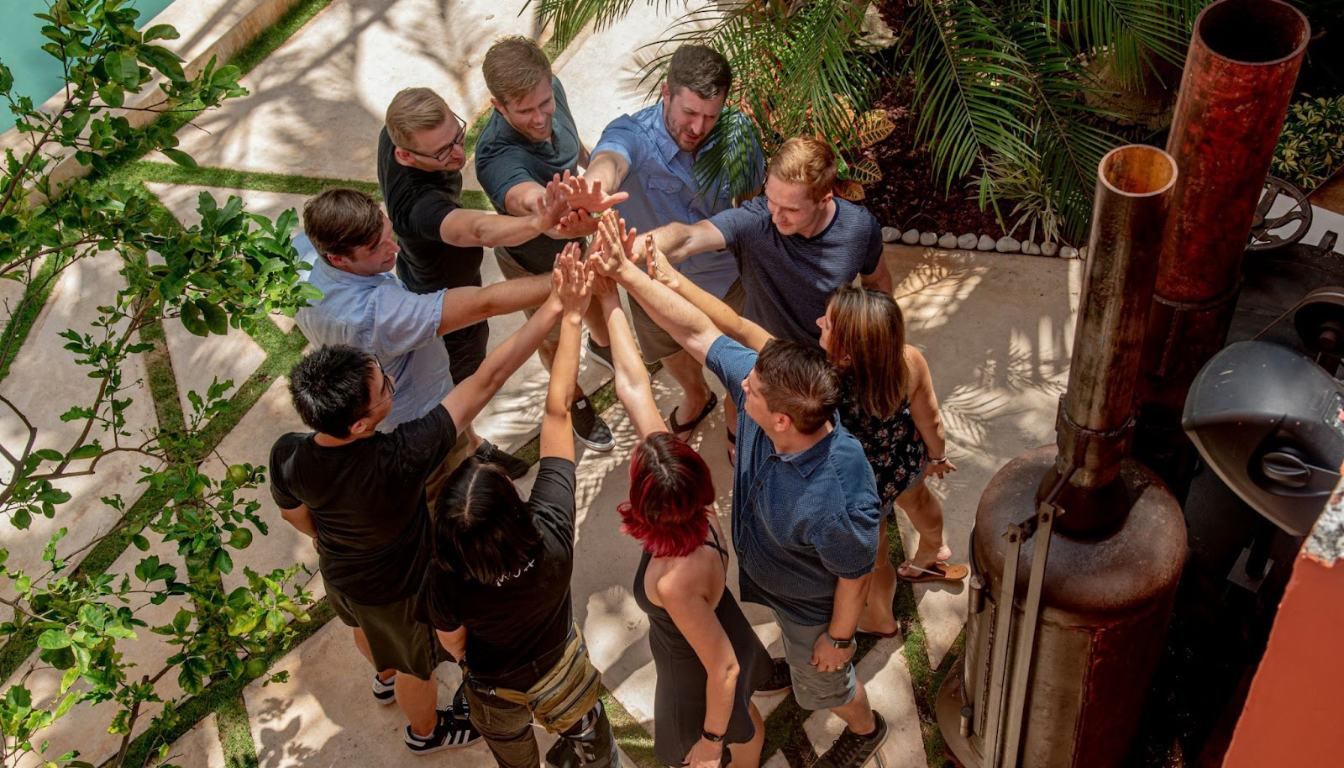9 Proven Strategies for Better Teamwork in the Workplace

Struggling with teamwork issues in your workplace? You’re not alone. Better teamwork is key to achieving higher productivity and job satisfaction. In this article, you’ll find 9 practical strategies to improve collaboration and build a stronger team.
Key Takeaways
- Effective teamwork boosts productivity, creativity, and employee engagement by fostering collaboration and innovation.
- Clear goals and defined roles enhance accountability and alignment within teams, leading to improved performance and cohesion.
- Open communication and trust are crucial for successful teamwork, promoting a supportive environment that encourages idea sharing and reduces conflicts.
The Importance of Teamwork in the Workplace

Teamwork in the workplace is the cornerstone of productivity, creativity, and employee engagement. Effective collaboration allows team members to leverage each other’s unique talents and skills, providing a competitive edge that is hard to beat. A successful team not only enhances productivity but also fosters team engagement and a happier work environment, which in turn contributes to overall productivity.
Distributing responsibilities within a team reduces burnout. Recognizing their role in a collective effort, individual members share the pressure of difficult tasks, promoting collaboration for a sustainable work pace. Collaboration fosters an environment where creative solutions can emerge. Brainstorming sessions encourage free expression of ideas, leading to innovative approaches not possible in isolated settings.
Effective teamwork enables smarter risk-taking. Supported by colleagues, team members feel more confident in pursuing innovative ideas, assured of their team’s backing. This sense of security can lead to greater overall productivity, as effective teams work more cohesively towards their shared goals, fostering successful collaboration.
Team work goes beyond dividing tasks; it multiplies success. Together, individual team members can achieve far more than the sum of their individual efforts, setting the stage for strategies designed to improve teamwork and drive organizational success with a strong team development and greater teamwork. This is how the entire team contributes to their own success and the overall mission through effective team collaboration. Great teamwork begins when team members work together, unlocking their full potential in a team focused environment, fostering collective success and aligning with team values.
Setting Clear Team Goals
Clear team goals guide efforts and foster a sense of purpose and unity. Understanding their objectives, team members can align their efforts more effectively, contributing to team success. Clear goals enable teams to ensure every team member understands their role in the bigger picture, essential for successful teamwork.
Specific goals create accountability. Well-defined organizational objectives offer several benefits:
- Make it easier to measure progress and success, allowing teams to adjust strategies as needed.
- Help prioritize tasks, ensuring critical tasks are addressed first.
- Enable efficient allocation of resources.
Team building activities can further align employees towards shared objectives, enhancing productivity and reinforcing the importance of common goals. Setting clear and specific goals enables cohesive work, leading to improved performance and successful business outcomes.
Encouraging Open Communication Among Team Members
Open communication is the foundation of a trusted and loyal team. When members feel safe to share thoughts without fear of judgment, it fosters trust and collaboration. An open-door policy encourages free communication, reducing misunderstandings and conflicts.
Leaders play a pivotal role in promoting open communication by:
- Modeling active listening and approachability to set the tone for open dialogue.
- Holding regular team meetings to provide structured opportunities for members to voice ideas and concerns, ensuring everyone feels heard, including the team leader.
- Using anonymous feedback tools to help employees share ideas and concerns without fear, promoting a culture of openness, especially among great leaders.
Various communication channels accommodate different employee preferences, enhancing participation and engagement. Recognizing and rewarding open internal communication encourages team members to share feedback and ideas, reinforcing a culture of open dialogue.
Fostering open communication builds trust, reduces conflicts, and enhances overall team performance. Creating a safe and open environment enables more effective collaboration, leading to greater success.
Building Trust Within Teams
Trust is the foundation of any successful team. Trusted team members are more likely to hold their weight, honor commitments, and support one another. Psychological safety, where members feel safe to express ideas and concerns without fear of repercussions, is crucial for developing trust.
Managers build trust and improve team performance by:
- Exhibiting integrity and prioritizing team members’ well-being.
- Enhancing transparency in decision-making to increase psychological safety, making team members feel valued and respected.
- Fostering genuine relationships among team members to improve camaraderie and mutual respect.
High-trust organizations report increased employee engagement and lower stress levels, demonstrating the benefits of a trust-based culture. Involving employees in job crafting, where they shape roles to fit their strengths and interests, fosters trust and drives innovation.
Building trust within teams requires ongoing cooperation, honest communication, and reciprocal respect. Prioritizing these elements helps teams develop strong, trust-based relationships that enhance overall performance and success.
Defining Roles and Responsibilities
Clear roles and responsibilities are essential for effective teamwork. Employees who understand their roles report higher job satisfaction and lower turnover rates. Understanding specific responsibilities and expectations boosts performance and reduces conflicts, facilitating smoother collaboration, allowing employees to manage their own tasks.
Documenting each role’s scope clarifies ownership and accountability among team members. Continuous evaluation and updating keep roles aligned with the organization’s evolving goals. Centralized platforms like Hub make documentation accessible, ensuring everyone is on the same page.
Clear roles and responsibilities conserve energy by minimizing misunderstandings and allowing focus on meaningful day to day tasks. This clarity enhances teamwork and contributes to higher employee engagement and overall organizational success.
Leveraging Diverse Teams for Creative Solutions

Diverse teams are a powerful asset. They enhance creativity and performance by providing multiple teams’ perspectives on challenges. Research shows diverse teams often produce more creative solutions due to the blend of different experiences and viewpoints, contributing to the formation of strong teams and high performing teams.
Diverse viewpoints help teams adapt strategies more effectively in changing environments. Team building exercises enhance creativity by allowing members to approach familiar tasks from different perspectives. Cross-functional projects allow employees to expand skills and gain insights into different organizational areas.
Continuing education fosters critical discussions that can lead to innovative thinking. Leveraging a diverse team’s strengths helps organizations attain uncommon results and drive greater success.
Utilizing Effective Team Meetings
Effective team meetings are crucial for successful teamwork. A clear agenda outlining topics and objectives ensures team members understand what needs to be accomplished. Providing supporting documents before the meeting allows participants to come prepared and engaged.
To maintain focus and improve meeting effectiveness:
- Note off-topic discussions for later consideration.
- Implement a ‘no screens’ rule to enhance engagement and ensure active involvement.
- Start and end meetings promptly to respect everyone’s schedules and emphasize time management.
Summarizing key points and action items ensures clarity and accountability among team members. Utilizing these strategies, teams can conduct more effective meetings that drive collaboration and success.
Implementing Team Building Exercises

Team building exercises enhance performance and improve communication, trust, and collaboration. Benefits of team building participation include:
- Improving morale, creating a positive atmosphere that fosters employee satisfaction
- Promoting positive mental and physical health, contributing to a healthier work environment
- Boosting employees’ confidence
- Encouraging idea sharing in the workplace
Fostering strong teamwork requires intentional experiences that bring people together. Offsite curates activities to strengthen collaboration, boost morale, and encourage genuine connection. They provide structure and support to turn inspiration into action, helping organizations design retreats and gatherings focused on improving teamwork, including team retrospectives and a virtual escape room.
Providing Continuous Learning Opportunities
Continuous learning opportunities enhance teamwork skills, increase engagement, and boost job satisfaction. Learning opportunities provide diverse insights, enhancing job satisfaction, morale, and productivity. In team environments, individuals learn from each other’s experiences, fostering personal growth and knowledge sharing.
Talent sharing involves moving star employees to new roles or discussing their growth, ensuring effective utilization of their skills within the organization. Promoting continuous learning enhances teamwork and drives greater success; after all, talent wins games.
Recognizing and Rewarding Team Efforts

Recognizing and rewarding achievements fosters trust and motivation within teams:
- Employees work harder when their efforts are acknowledged and rewarded.
- Specific, genuine recognition is more impactful than generic praise.
- Specific recognition demonstrates attention to individual contributions, making employees feel valued.
Celebrating individual commitment and team efforts strengthens trust and promotes a collaborative work environment. Encouraging peer recognition enhances workplace morale and improves job satisfaction. Recognition helps employees understand their contributions’ impact, fostering a sense of belonging.
Recognizing and rewarding team efforts enhances motivation, reinforces positive behaviors, and drives greater success to encourage teamwork.
Summary
Enhancing teamwork in the workplace involves setting clear goals, encouraging open communication, building trust, defining roles, leveraging diverse teams, utilizing effective meetings, implementing team building exercises, providing continuous learning opportunities, and recognizing and rewarding team efforts. By adopting these strategies, organizations can foster a collaborative and successful work environment, leading to greater productivity and success. Platforms like Offsite support this effort by helping teams plan impactful retreats and offsites that strengthen relationships, boost morale, and align everyone around shared goals. Remember, teamwork begins with intentional efforts to bring people together and harness their collective strengths.
FAQs
- Why is teamwork important in the workplace?
Teamwork is crucial in the workplace as it boosts productivity, fosters creativity, and increases employee engagement, ultimately giving organizations a competitive advantage.
- How can clear team goals improve teamwork?
Clear team goals significantly enhance teamwork by providing direction, fostering unity, and creating accountability, which collectively help in measuring progress and success.
- What role does open communication play in teamwork?
Open communication is essential in teamwork as it fosters trust, minimizes conflicts, and enhances overall performance by creating a safe space for sharing ideas. Emphasizing transparency and dialogue ensures all team members feel valued and engaged.
- How can team building exercises benefit a team?
Team building exercises enhance communication, trust, and collaboration within a team, leading to improved morale and overall performance. This fosters a positive work environment that can significantly boost productivity.
You may also like
Unique spaces for your next offsite
Find distinctive venues for your upcoming corporate retreat.
Stay Updated with Our Insights
Get exclusive content and valuable updates directly to you.







